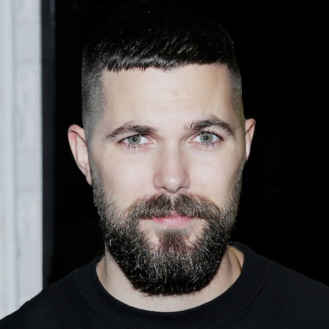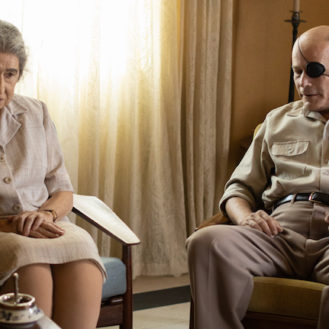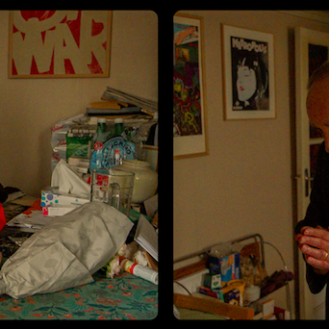By: Jeff Ching
The idea of a random Joe Schmoe appearing in everyone’s dreams is an intriguing premise, but could Dream Scenario’s writer/director Kristoffer Borgli (Sick of Myself) have ever imagined a better set-up than Nicolas Cage portraying this ubiquitous dream character? The answer to my rhetorical question is a resounding “hell no!”. In fact, at the post-screening Q&A at this year’s TIFF, Cage explained how he easily relates to this character and brought up the meme about himself; how he became such an internet phenomenon when someone uploaded a YouTube video featuring clips of the actor losing his mind in past films. He learned that, ultimately, this is how most people know him and what they love him for. But what Dream Scenario conveys is that the “socially awkward Nicolas Cage” may be the actor’s most memorable on-screen personality.
The first half hour of Dream Scenario has some big laughs, as evolutionary biology professor Paul Matthews (Cage) works his way through uncomfortable situations and tries to “play it cool” (while also failing horribly at doing so). However, the second half of Borgli’s odd flick is noticeably inferior compared to the scenes that came before it and, even at 100 minutes, the movie feels long. Once Borgli transitions from the crazy, outlandish premise and drifts into a more familiar satirical territory with the protagonist’s downfall, Dream Scenario loses steam and becomes repetitive. Flaws that could’ve been ironed out if the movie was, let’s say, a slim 80 minutes.
Matthews’ profession is a job that pays the bills, but it’s not his ultimate passion. He dreams about being a published author, but he has yet to write a single page. He’s a rather unremarkable person. His students don’t share his interest of biology, his daughters find him to be an annoying dad, and he’s not respected enough to be invited to lively dinner parties hosted by his peers.
He is a man of good ideas, yet a former student of his has stolen his ideas and put them into her own biology book. He gets a coffee with her, ready to verbally thrash her while secretly recording his verbal annihilation of this inferior person. This particular scene is a great example of “expectations vs. reality”. The way this scene is cut together, as well as how it jumps back and forth in time, is brilliant. Anyone who’s editing a comedy should study this scene, as I highly doubt it was this funny on paper.
Things change for this rather unremarkable man when he randomly starts appearing in people’s dreams – not just his daughters and a bunch of his students, but thousands of strangers. Kristoffer Borgli never explains exactly why this happens, so the audience just has to “go with it”. Paul becomes a celebrity. There’s a news story about him, to which he happily does an interview about this new inexplicable phenomenon. He gets a meeting with a marketing firm, with a young hipster CEO (Superbad’s Michael Cera – perfectly cast for this role that brings him out of his usual wheelhouse). Paul naively believes that this firm will be on board with his biology book but, instead, they have different plans. Maybe if a social media campaign is done, with pictures of him drinking Sprite, that can lead to product placement in people’s dreams? Would there be a more effective form of advertising than that?
His biology lectures start gathering huge turnouts. Paul welcomes this new attention as he asks all the students to describe their dreams. The dream is almost the same for everyone: a crazy disaster is happening, the dreamer is very much on the brink of death, Paul nonchalantly enters as if he’s a passive observer to the dreamer’s eventual doom. The dream scenes are so much fun that I wish the movie provided more of them. Paul is disappointed that he doesn’t have a bigger role to play in these dreams – “Be careful what you wish for…”
What’s worse than being a random bystander in someone’s dream when they’re about to die? Actually murdering them! Paul Matthews becomes the Freddy Krueger of the social media age, except people don’t actually die in real life if they get killed by Paul. Public opinion on him sours, and he becomes the most hated man on the internet. Soon enough, nobody that knows him wants anything to do with him. He’s ousted by everyone in his city, despite not doing anything wrong.
This new development to Paul’s dream role is where the movie examines the dark side of internet fame and “cancel culture”. Dream Scenario makes its point, but then drags it out. Watching Paul be ostracized by just about every person and establishment gets tiresome. I really wish the movie moved faster towards its resolution, as it takes a very interesting turn and sticks its strong conclusion.
I also wish the nightmare scenes of Paul being a contemporary terror were filmed like a horror movie. If you reference Freddy Krueger, try pulling off your own style of a scary “Freddy Krueger murder”. This direction could’ve been a great opportunity for genre-bending.
Despite the criticisms, Dream Scenario is still fun and a much better kooky vehicle for the actor compared to The Unbearable Weight of Massive Talent. With its mix of dark, awkward, raunchy, and satirical humour, Dream Scenario is one of the funniest movies of the year featuring one of Nicolas Cage’s best performances in a long time.
**** (out of 5)
**********
Read more of Jeff Ching’s thoughts on film at The Ching of Comedy’s blog.





Be the first to comment